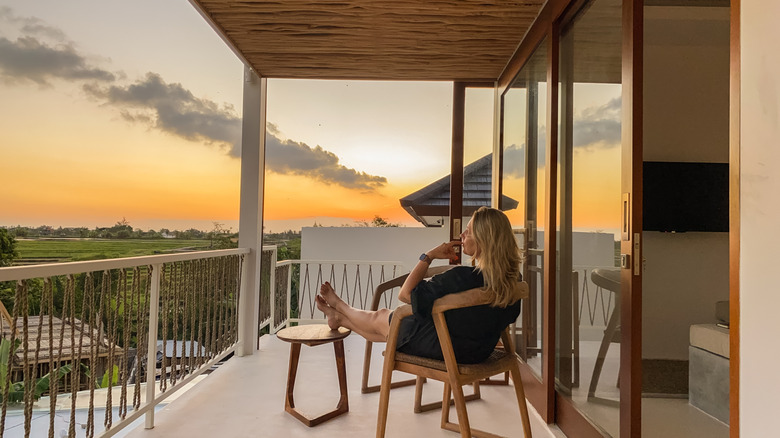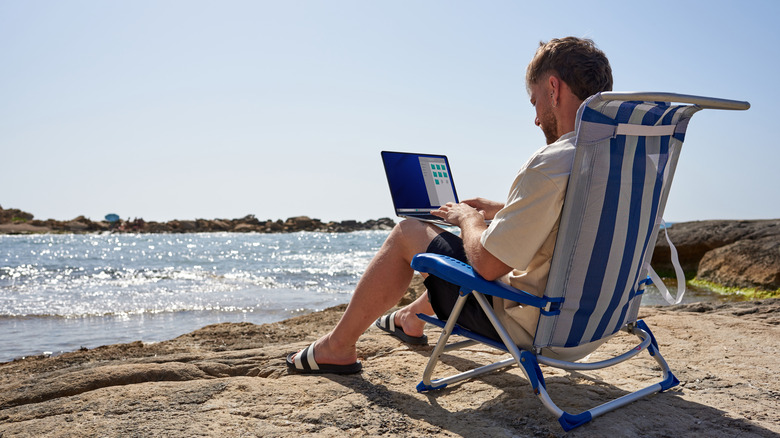A New 'Immersive' Style Of Vacation Is Emerging In Response To Over Tourism, But Can You Afford It?
With limited vacation days and the ever-looming pressures of "real life" waiting for you back at home, sometimes travel can be quite the whirlwind. Many travelers feel pressure to see as much as possible during a short amount of time, especially during expensive trips overseas. While it's absolutely reasonable to try to make the most of your vacation, sometimes a jam-packed itinerary can take away from truly experiencing the heart and soul of a destination. You may be left feeling as though you've only dipped your toes into the places you've traveled. If you've ever been left feeling a little disappointed or longed for more time to explore once you return home from your vacation, you may want to consider opting for slow travel in the future — if you can afford it.
According to recent data, slow travel is one of the biggest travel trends for 2025. More tourists are starting to realize that they're missing out on something special and that their trips are feeling more like a highlight reel of tourist attractions, as opposed to a meaningful cultural immersion. The solution is to travel slower (and for longer) in order to experience a destination as a local might. Your trips become more meaningful, and slow travel can be a more environmentally sustainable way to travel when compared to taking many short trips throughout the year. Long, leisurely trips overseas may sound like something that is only accessible for the rich and famous, but if you get creative, you might be able to stretch your budget enough to enjoy a longer stay.
The case for slow travel
If you're a frequent traveler, you've likely realized that some types of vacations are the opposite of relaxing. While exciting and fun, it can also be exhausting and stressful to rush around catching trains, planes, and automobiles in order to stuff every possible adventure into your allotted vacation time. Certain popular tourist attractions are bucket list spots that everyone should see at least once in their lifetime, but it's worth carving out some extra time to enjoy the lesser known and underrated destinations as well.
Instead of planning several short international trips that last for a week or two, more travelers are starting to save up their vacation days (and vacation budgets) in order to spend a month or longer exploring their destination of choice. Slow travel is perfect if you're longing for relaxation and cultural connections. Imagine: Instead of waking up early to grab a cheap hotel breakfast so that you can spend the entire day adhering to a strict sightseeing schedule, you will have the time to wake up slow, grab coffee at local café, and visit a lively outdoor market. Afterwards, you can return to the quaint apartment you've rented for a few weeks and cook a delicious brunch. Perhaps you'll fill your days with cooking classes or studying a new language. You can take day trips to nearby villages or spend hours wandering unfamiliar streets while admiring the architecture and discovering quaint shops and restaurants. You might make lifelong friends with locals you meet along the way or discover a new favorite food. If you've ever visited a place and thought, "In another life, I would have loved to live here," then slow travel is for you.
How to travel slow
For most tourists, the biggest barriers when it comes to slow travel (and travel in general) are time and money. Over the past several years, some companies have begun offering more opportunities to work from home, or even hybrid schedules where employees can work part of the time in the office and part of the time from their computer at home. These flexible schedules have led to a rise in the "digital nomads" who travel the world while working their regular jobs.
Working remotely while traveling allows you to set up shop anywhere, so it's a great way to travel slow. Your office can be a cute café, an Airbnb, or even a beach chair overlooking the ocean. Some progressive companies have even started to offer unlimited paid time off under the assumption that their employees perform better with freedom and flexibility. As long as employees are able to manage their workload, there's no harm in extra time off. If travel is one of your passions, prioritize it when you hunt for jobs. Consider making a career change that allows for more freedom so that you can tackle the time and money problem all at once.
If time is the issue, try strategically using your existing vacation days. By taking your time off around scheduled holidays, you'll be able to stretch them further. If you have the time but you don't want to break the bank, consider choosing budget-friendly destinations or smaller towns instead of the most popular tourist cities. Instead of staying in London, for example, consider booking a cottage in the English countryside — and take the train into the city whenever you want. Spending a month traveling around Mexico on a mid-range budget is half the cost of a month-long trip through the United States.


